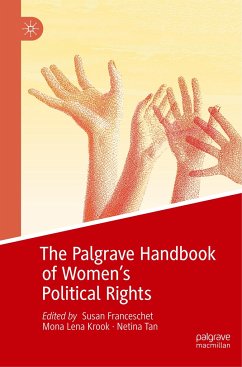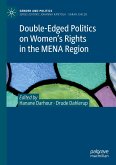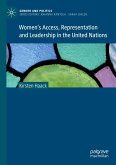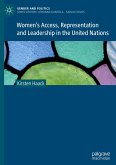The Palgrave Handbook of Women's Political Rights
Herausgegeben:Franceschet, Susan; Krook, Mona Lena; Tan, Netina
The Palgrave Handbook of Women's Political Rights
Herausgegeben:Franceschet, Susan; Krook, Mona Lena; Tan, Netina
- Broschiertes Buch
- Merkliste
- Auf die Merkliste
- Bewerten Bewerten
- Teilen
- Produkt teilen
- Produkterinnerung
- Produkterinnerung
This Palgrave Handbook provides a definitive account of women's political rights across all major regions of the world, focusing both on women's right to vote and women's right to run for political office. This dual focus makes this the first book to combine historical overviews of debates about enfranchising women alongside analyses of more contemporary efforts to increase women's political representation around the globe. Chapter authors map and assess the impact of these groundbreaking reforms, providing insight into these dynamics in a wide array of countries where women's suffrage and…mehr
Andere Kunden interessierten sich auch für
![Measuring Women's Political Empowerment across the Globe Measuring Women's Political Empowerment across the Globe]() Measuring Women's Political Empowerment across the Globe73,99 €
Measuring Women's Political Empowerment across the Globe73,99 €![Double-Edged Politics on Women's Rights in the MENA Region Double-Edged Politics on Women's Rights in the MENA Region]() Double-Edged Politics on Women's Rights in the MENA Region81,99 €
Double-Edged Politics on Women's Rights in the MENA Region81,99 €![Double-Edged Politics on Women's Rights in the MENA Region Double-Edged Politics on Women's Rights in the MENA Region]() Double-Edged Politics on Women's Rights in the MENA Region69,99 €
Double-Edged Politics on Women's Rights in the MENA Region69,99 €![The Palgrave Handbook of Gender and Development The Palgrave Handbook of Gender and Development]() The Palgrave Handbook of Gender and Development186,99 €
The Palgrave Handbook of Gender and Development186,99 €![Women's Access, Representation and Leadership in the United Nations Women's Access, Representation and Leadership in the United Nations]() Kirsten HaackWomen's Access, Representation and Leadership in the United Nations97,99 €
Kirsten HaackWomen's Access, Representation and Leadership in the United Nations97,99 €![Women's Access, Representation and Leadership in the United Nations Women's Access, Representation and Leadership in the United Nations]() Kirsten HaackWomen's Access, Representation and Leadership in the United Nations97,99 €
Kirsten HaackWomen's Access, Representation and Leadership in the United Nations97,99 €![The Palgrave Handbook of Contemporary International Political Economy The Palgrave Handbook of Contemporary International Political Economy]() The Palgrave Handbook of Contemporary International Political Economy200,99 €
The Palgrave Handbook of Contemporary International Political Economy200,99 €-
-
-
This Palgrave Handbook provides a definitive account of women's political rights across all major regions of the world, focusing both on women's right to vote and women's right to run for political office. This dual focus makes this the first book to combine historical overviews of debates about enfranchising women alongside analyses of more contemporary efforts to increase women's political representation around the globe. Chapter authors map and assess the impact of these groundbreaking reforms, providing insight into these dynamics in a wide array of countries where women's suffrage and representation have taken different paths and led to varying degrees of transformation. On the eve of many countries celebrating a century of women's suffrage, as well as record numbers of women elected and appointed to political office, this timely volume offers an important introduction to ongoing developments related to women's political empowerment worldwide. It will be of interest to studentsand scholars across the fields of gender and politics, women's studies, history and sociology.
Produktdetails
- Produktdetails
- Gender and Politics
- Verlag: Palgrave Macmillan / Palgrave Macmillan UK / Springer Palgrave Macmillan
- Artikelnr. des Verlages: 978-1-349-95915-0
- Softcover reprint of the original 1st edition 2019
- Seitenzahl: 784
- Erscheinungstermin: 10. Dezember 2019
- Englisch
- Abmessung: 235mm x 155mm x 42mm
- Gewicht: 1184g
- ISBN-13: 9781349959150
- ISBN-10: 1349959154
- Artikelnr.: 57916279
- Herstellerkennzeichnung Die Herstellerinformationen sind derzeit nicht verfügbar.
- Gender and Politics
- Verlag: Palgrave Macmillan / Palgrave Macmillan UK / Springer Palgrave Macmillan
- Artikelnr. des Verlages: 978-1-349-95915-0
- Softcover reprint of the original 1st edition 2019
- Seitenzahl: 784
- Erscheinungstermin: 10. Dezember 2019
- Englisch
- Abmessung: 235mm x 155mm x 42mm
- Gewicht: 1184g
- ISBN-13: 9781349959150
- ISBN-10: 1349959154
- Artikelnr.: 57916279
- Herstellerkennzeichnung Die Herstellerinformationen sind derzeit nicht verfügbar.
Susan Franceschet is Professor of Political Science at the University of Calgary, Canada. She is the author of Women and Politics in Chile (2005) and co-editor of The Impact of Gender Quotas (with M. L. Krook and J. M. Piscopo, 2012). She has published extensively on women's political representation and political institutions in comparative perspective. Mona Lena Krook is Professor of Political Science at Rutgers University, USA. She is the author of Quotas for Women in Politics (2009) , as well as numerous articles on gender quotas, women's political representation, and violence against women in politics. Netina Tan is Assistant Professor of Political Science at McMaster University, Canada. Her dissertation, Hegemonic Party Rule in Singapore and Taiwan, won the 2011 Vincent Lemieux Prize for the best Ph.D. thesis in Canada. She has authored numerous articles on authoritarian resilience and representation of women and ethnic minorities in Asia.
1. Global Patterns and Debates in the Granting of Women's Suffrage.- 2. Gender and Electoral Behavior.- 3. The Political Representation of Women Over Time.- 4. The Impact of Women in Parliament.- 5. New Horizons in Women's Political Rights.- 6. Chile: Women's Suffrage and Political Participation, 1935-2015.- 7. Colombia: Civil Conflict, Violence, and Women's Political Participation.- 8. Mexico: The Long Road to Women's Suffrage.- 9. New Zealand: A Country of Firsts in Women's Political Rights.- 10. Finland: Suffrage, Nation, and Political Mobilization.- 11. Switzerland: Direct Democracy and Women's Political Participation.- 12. Canada: Uneven Paths to Suffrage and Women's Electoral Participation.- 13. Afghanistan: Uphill Challenges for Women's Political Rights.- 14. Kuwait: Why Did Women's Suffrage Take So Long?.- 15. Morocco: Ongoing Struggle for More Representation.- 16. Turkey: From Symbols to Actors inthe Struggle for Political Rights.- 17. Kenya: Women's Suffrage and Political Participation as Voters.- 18. Nigeria: Women's Suffrage, Change, and Continuities in Political Participation.- 19. Cameroon: Early Mobilization and Limited Impact of Women's Suffrage.- 20. Zimbabwe: Women's Mass Movement and Violence.- 21. China: Women's Political Rights Advocacy.- 22. Indonesia: Local Advocacy for Suffrage.- 23. Malaysia: Middle-Equality Trap.- 24. Sri Lanka: Struggle for Franchise.- 25. Czech Republic: Nationalism, Suffrage, and Political Participation.- 26. Russia: The Great War and Women's Political Rights.- 27. Bolivia: Parity, Empowerment, and Institutional Change.- 28. Cuba: Women's Complicated Political Participation and Representation.- 29. Uruguay: Slow Progress in Women's Political Representation.- 30. United States: Gendered Institutions, Processes, and Outcomes.- 31. Sweden: An Incremental Process.- 32. France: The Republic Tested by Parity.- 33. Australia: Uneven Progress toward Equality in Women's Political Rights.- 34. Jordan: Quotas and Change in Women's Political Representation.- 35. Tunisia: Changing Patterns of Women's Representation.- 36. Israel: A Century of Political Involvement.- 37. Mauritius: Still a Long Journey Ahead.- 38. Rwanda: Women's Political Representation and Its Consequences.- 39. Uganda: Achievements and Challenges for Women in Elected Office.- 40. Niger: Patterns of Women's Political Presence Since Independence.- 41. Ghana: Stalled Patterns of Women's Parliamentary Representation.- 42. South Korea: Women's Political Representation.- 43. Taiwan: Asia's Exception.- 44. Myanmar: Women's Political Life.- 45. India: A Contradictory Record.- 46. Poland: Regime Transformation and Women's Political Representation.- 47. Slovenia: From Socialist Legacies to Legislative Gender Quotas.- 48. Mongolia: Transformation of Women's Representation.- 49. Armenia: Persistent Gender Stereotypes.
1. Global Patterns and Debates in the Granting of Women's Suffrage.- 2. Gender and Electoral Behavior.- 3. The Political Representation of Women Over Time.- 4. The Impact of Women in Parliament.- 5. New Horizons in Women's Political Rights.- 6. Chile: Women's Suffrage and Political Participation, 1935-2015.- 7. Colombia: Civil Conflict, Violence, and Women's Political Participation.- 8. Mexico: The Long Road to Women's Suffrage.- 9. New Zealand: A Country of Firsts in Women's Political Rights.- 10. Finland: Suffrage, Nation, and Political Mobilization.- 11. Switzerland: Direct Democracy and Women's Political Participation.- 12. Canada: Uneven Paths to Suffrage and Women's Electoral Participation.- 13. Afghanistan: Uphill Challenges for Women's Political Rights.- 14. Kuwait: Why Did Women's Suffrage Take So Long?.- 15. Morocco: Ongoing Struggle for More Representation.- 16. Turkey: From Symbols to Actors inthe Struggle for Political Rights.- 17. Kenya: Women's Suffrage and Political Participation as Voters.- 18. Nigeria: Women's Suffrage, Change, and Continuities in Political Participation.- 19. Cameroon: Early Mobilization and Limited Impact of Women's Suffrage.- 20. Zimbabwe: Women's Mass Movement and Violence.- 21. China: Women's Political Rights Advocacy.- 22. Indonesia: Local Advocacy for Suffrage.- 23. Malaysia: Middle-Equality Trap.- 24. Sri Lanka: Struggle for Franchise.- 25. Czech Republic: Nationalism, Suffrage, and Political Participation.- 26. Russia: The Great War and Women's Political Rights.- 27. Bolivia: Parity, Empowerment, and Institutional Change.- 28. Cuba: Women's Complicated Political Participation and Representation.- 29. Uruguay: Slow Progress in Women's Political Representation.- 30. United States: Gendered Institutions, Processes, and Outcomes.- 31. Sweden: An Incremental Process.- 32. France: The Republic Tested by Parity.- 33. Australia: Uneven Progress toward Equality in Women's Political Rights.- 34. Jordan: Quotas and Change in Women's Political Representation.- 35. Tunisia: Changing Patterns of Women's Representation.- 36. Israel: A Century of Political Involvement.- 37. Mauritius: Still a Long Journey Ahead.- 38. Rwanda: Women's Political Representation and Its Consequences.- 39. Uganda: Achievements and Challenges for Women in Elected Office.- 40. Niger: Patterns of Women's Political Presence Since Independence.- 41. Ghana: Stalled Patterns of Women's Parliamentary Representation.- 42. South Korea: Women's Political Representation.- 43. Taiwan: Asia's Exception.- 44. Myanmar: Women's Political Life.- 45. India: A Contradictory Record.- 46. Poland: Regime Transformation and Women's Political Representation.- 47. Slovenia: From Socialist Legacies to Legislative Gender Quotas.- 48. Mongolia: Transformation of Women's Representation.- 49. Armenia: Persistent Gender Stereotypes.








